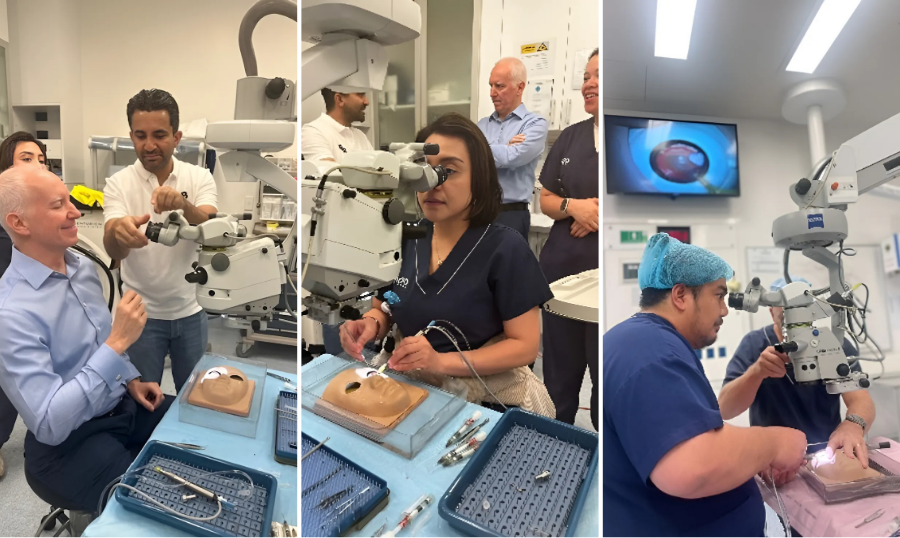Auckland Eye sets new standard in digital accessibility with website toolbar launch
Discover how Auckland Eye is redefining inclusive healthcare by launching New Zealand’s first assistive website toolbar.

There’s very little of everyday life that hasn’t been affected by the global pandemic. Between social distancing restrictions and stay-at-home orders, most people have been forced to adopt a more digital lifestyle – and that means spending exponentially more time looking at screens.
While these technologies have enabled us to stay connected at a time when things have felt disconnected, too much screen time can lead to eye strain, headaches and neck and back pain.
When you view something up close, a muscle inside your eye — known as the ciliary muscle — contracts and changes the shape of your lens to help you focus and see clearly. After hours of being contracted, that muscle gets tired and begins to ache.
Discomfort and eye-related symptoms caused by prolonged screen time aren’t new problems. What has increased with COVID-19, as one study discovered, is the number of people at risk of experiencing what is known as eye fatigue or eye strain.
Extended exposure to blue light and the glare from our electronic devices, coupled with the intensity of sustained concentration, can bring about some unpleasant symptoms like:

While eye fatigue is understandably uncomfortable, the good news is it’s not likely to “ruin your eyes” – despite the old warnings.
New research indicates that children might face long-term effects and be at greater risk of myopia (near-sightedness) especially if their learning and downtime involve using a laptop or phone for long hours. But that doesn’t mean you or your family have to put up with dry, achy eyes, a sore neck or headaches.
Here are some simple tips to avoid eye strain and protect your vision:
Position your computer screen further away
Open your laptop and sit at your desk. Your screen should be an arm’s length away and a bit below your line of vision. This will stop you from slouching forward in your chair, which can cause a sore neck and more frequent headaches.
Tilt your screen to reduce glare
Glare can be a major contributor to eye strain so avoid working outdoors and stay away from bright lights. Tilting your screen slightly downwards can also help, as well as using blue light glasses or a screen cover. This stops the harmful blue light from entering your retina — a thin layer of tissue at the back of your eye that senses light and helps you see things.
Adjust the brightness and contrast of your screen
When your screen is significantly brighter than your surroundings, your eyes must work harder to see it. You’re likely to experience this shift during the afternoon or in the evening when it gets dark.
Practice the 20-20-20 rule
Take a break every 20 minutes – set a timer if you need to. Look at an object at least five metres away (20 feet) for 20 seconds to give your eye muscles a chance to relax. Even better, step outside – this has been shown to reduce the progression of near-sightedness.
Keeping blinking
Blinking is important because it’s your body’s way of keeping the eyes lubricated. On average, people blink 15 to 20 times per minute, but when we stare at our computers, we blink 66% less.
Use high-quality lubricating eye drops for dry eye
Dry eye can occur when tears can’t provide the adequate lubrication your eyes need. It can also be related not to tear quantity but to eyelid and skin inflammation. To prevent this, consult the experts at our leading-edge Dry Eye treatment facility, Oasis Spa, to get a tailored treatment plan.
Put your devices to bed on warm mode
Electronic devices recreate high-energy blue light artificially. That’s why constantly looking at our screens, especially in the dark or for long hours at a time, strains our eyes and has the potential to damage the retina, causing vision-related issues and diseases.
Sleep is critical to your physical and mental wellbeing, and your eyes play an important role in helping you wind down. Choose the warmest possible setting for your screen from around 7 pm through to the following morning to help your body keep its natural 24-hour clock.
Get annual vision check-ups
Underlying eye conditions or changes in your eye health can make you more susceptible to eye fatigue. If you already use glasses or lenses, make sure to get your eyes checked regularly. Even if you don’t have long-term eye conditions, go in for a full eye check-up every year.
Healthy lifestyle = healthy eyes
Looking after your eyes (as with any other part of your body) also requires you to make healthy lifestyle choices, including what you eat and drink.
A healthy diet can help strengthen your eyes to resist the detrimental effects of blue light and support macular pigments that block up to 80% of the blue light that tries to enter the retina.

Keeping connected during the pandemic has been possible thanks to digital technologies, but the increase in screen time is causing more and more people to experience eye fatigue and vision-related issues. Prevention is key – even if you don’t show symptoms, there are steps you can take to prevent future complications and protect your eyes.
Let’s get you seeing clearly, so you can live life to its fullest. Get in touch with the Auckland Eye team today.

Discover how Auckland Eye is redefining inclusive healthcare by launching New Zealand’s first assistive website toolbar.

Macular degeneration is a leading cause of vision loss in older adults. There’s no cure, but its progression can be slowed. Here’s what to know.

Auckland Eye hosted an extraordinary Continued Medical Education (CME) day titled “Walk in Our Surgeons’ Shoes (Socks)”.